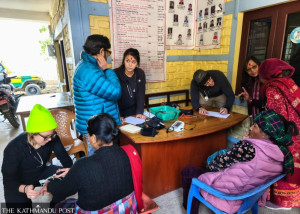Health
WHO lauds Nepal’s legal curbs on trans-fatty acids in food
In the South-East Asia Region, non-communicable diseases cause 69 percent of the nearly nine million deaths every year.
Post Report
The World Health Organization has congratulated Nepal on introducing legislation to restrict the levels of industrially produced trans-fatty acids in the food supply, thereby promoting health and saving lives.
Eliminating trans-fatty acids is a cost-effective measure with great health benefits for preventing premature deaths from cardiovascular diseases, said Saima Wazed, the regional director of the WHO South-East Asia.
Prioritising prevention and control of noncommunicable diseases (NCDs) in the South-East Asia Region, WHO has been supporting countries in eliminating trans-fatty acids from national food supplies, along with other measures. With Nepal’s legislation, now nearly 80 percent of the region’s population—1.6 billion—will be potentially protected from the harms of trans-fatty acids.
Globally, 540,000 deaths every year can be attributed to the intake of industrially produced trans-fatty acids. High trans-fat intake significantly increases the risk of death from cardiovascular diseases. Trans fat has no known health benefits.
In the WHO South-East Asia Region, non-communicable diseases cause 69 percent of the nearly nine million deaths every year. Cardiovascular diseases are a major cause of death.
In 2018, WHO released REPLACE, a guide of six strategies, to help eliminate industrially produced trans-fatty acids. In collaboration with Resolve to Save Lives, REPLACE protocols are being implemented across the region.
By 2022 Thailand, India and Bangladesh had adopted regulations for eliminating trans-fatty acids in the food supply chain. Indonesia had complementary policy measures. Sri Lanka issued a regulation in 2023. Nepal issued the legislation on trans-fatty acids on February 8 in the Nepal gazette.
According to the Department of Food Technology and Quality Control, the legislation is mandatory for all food processing companies.
It has included some provisions, defined what will be considered industrial trans fat, and determined the quality limit. In the food items that fall in this category, the amount of trans fat shouldn’t exceed 2 percent of the weight of the total fatty acids contained in the food items, the provision reads.
It also states that the method for laboratory analysis will be as per the updated method for trans fat analysis by gas chromatography of the Official Methods of Analysis of AOAC International, formerly the Association of Official Agricultural Scientists.
“The legislation will come into effect after six months,” said Mohan Krishna Maharjan, the department spokesperson.
Restricting trans-fatty acids is one of the measures under WHO South-East Asia Region’s ‘SEA HEARTS’ that emphasises united effort across all partners and stakeholders for aligned and effective acceleration of actions to reduce deaths from cardiovascular diseases.
Nepal’s legislation on trans-fatty acids will add 30 million people to the SEA HEARTS target of protecting two billion people from the harmful effects of trans-fatty acids through best practice or complementary policy measures of WHO REPLACE by 2025.
WHO has been urging countries in the region to focus on best-practice policies, monitoring and surveillance to drive progress against trans-fatty acids.
Last month, Thailand was among the first five recipients of WHO certificate validating progress in eliminating industrially-produced trans-fatty acids.
Eliminating trans-fatty acids from the food supply will enhance people's health and well-being and help attain the SDG targets of reducing premature mortality from noncommunicable diseases by a third by 2030.




 10.12°C Kathmandu
10.12°C Kathmandu













